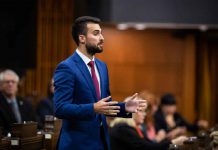Robinson-Superior Treaty and Fort William First Nation Territory, Thunder Bay, Ontario – BUSINESS – The Nishnawbe Business Professionals Association says that Budget 2021 is encouraging.
Jason Rasevych, President of the Anishnawbe Business Professionals Association, regarding the Government of Canada’s 2021-22 Budget:
“The Federal Liberals 2021-2022 budget for Canada reflects a long-term investment approach aimed at fueling economic growth out of the pandemic through substantial investment in social infrastructure to strengthen foundations essential for a robust, resilient, and inclusive economy.
ABPA is encouraged to see a budget that appears to reflect the need to strategically address the significant social equity gap between Indigenous and non-Indigenous communities through its allocation of $18 billion targeted at a wide spectrum of near and long-term needs to support improved socio-economic outcomes for Indigenous Peoples of Canada who will take on an increasingly vital role in determining Canada’s future economic growth.
$1 billion in continued financial support through the Indigenous Community Support and Indigenous Community Business Funds will help ensure that the immediate and unique health and safety needs of Indigenous communities and businesses are met during the pandemic, including ensuring adequate supply of PPE and health services to remote Northern Ontario First Nations communities.
Considerable allocations for Indigenous Early Learning and Child Care, after-school care on reserve, post-secondary education, First Nations programming and capacity-building, First Nations Child and Family Services, and other essential health, education, and social services on reserve, including Indigenous-led and designed mental health and police response services, hold promise for improved social outcomes for Indigenous communities that continue to struggle with the legacy of colonialism, systemic racism, and economic marginalization.
The $6 billion allocated for Indigenous-led infrastructure development and maintenance, $64 million for Indigenous entrepreneurs, further investment to hopefully improve Canada’s ability to meet the promised 5% procurement target with Indigenous-led businesses, and the $31 million allocated to support co-development of an action plan with Indigenous partners to implement the United Nations Declaration on the Rights of Indigenous Peoples, including the meaning of full, prior and informed consent for major resource and infrastructure projects, further set the stage for considerable progress towards economic reconciliation.
Of particular interest to ABPA, is the budget’s outline of strategic investments in Canada’s energy transition and goal to reach Net Zero by 2050. Two funding allocations in particular stand out. Investing in the Forest-based Bioeconomy to advance wood-based innovations for use in building materials, biofuels, and bioplastics to help drive Canada’s low-carbon economy will mean increased tree harvesting. Budget allocations to realize Canada’s role as a key global supplier of critical minerals for manufacturing electric vehicle batteries, solar panels, and other low-carbon technologies, suggests dependence on intensive mineral extraction. Given Northern Ontario’s forest and mineral abundance, the region has an integral role to play in achieving these aspirations. Resource developers and governments will need to demonstrate understanding of the necessary and pivotal role that Northern Ontario First Nations play within this paradigm given their unique rights and land title. Continued funding to support remote First Nations business, tourism and expansion in the resource sector will help ensure success. First Nation’s rights and consent must be achieved before development proceeds and partnership, ownership and equity will be part of the equation towards building social license.
While the budget holds promise as a path to reconciliation and economic growth through its support of developing strong partnerships with First Nations, success will only be realized through effective roll out and accountability. The federal government will need to demonstrate a well-executed and collaborative approach with First Nations. ABPA stands ready as an advocate for the Northern Ontario First Nations business community and will be watching and eager to play a role in ensuring the above outlined programs meet the demands of the North”.
About the ABPA:
The Anishnawbe Business Professional Association (www.anishnawbebusiness.com) is a non-profit, member-based organization based in Thunder Bay, Ontario. ABPA serves the First Nation business community within the Treaty #3, Treaty#5, Treaty #9 and Robinson Huron and Superior Treaty Areas. The ABPA develops and expresses positions on business issues and other public issues relevant to First Nation business, on behalf of its members. They provide a forum for the First Nation business community to develop policies and programming which contribute to the socio-economic well-being and quality of life of First Nations peoples in Northern Ontario. They also serve non-First Nation businesses by providing information, guidance, and access to a wide-ranging network through events and sponsorship.
The current ABPA Board of Directors include:
- Jason Rasevych, President, Ginoogaming First Nation
- Rachael Paquette, Vice-President, Mishkeegogamang First Nation
- Ron Marano, Vice-President, North Caribou Lake First Nation
- Jason Thompson, Secretary/Treasurer, Red Rock Indian Band
- Brian Davey, Director, Moose Cree First Nation
- Steven McCoy, Director, Garden River First Nation
- Tony Marinaro, Director, Naicatchewenin First Nation







